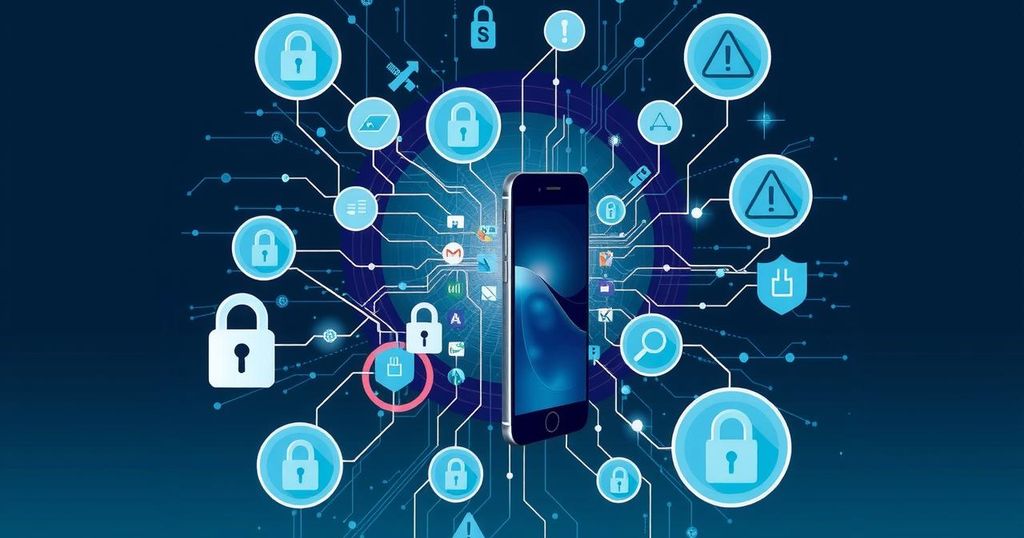Cybersecurity Experts Warn of Mobile Security Crisis Linked to Chinese Hackers

Cybersecurity experts have identified a rise in unusual smartphone crashes linked to sophisticated cyberattacks that reportedly target individuals in government, tech, and journalism. Chinese hackers may exploit vulnerabilities in mobile devices to access sensitive information without user interaction. Experts warn that lapses in user security practices contribute to the mobile security crisis amid ongoing Chinese cyber threats.
In a concerning twist, a spike in unusual smartphone crashes is raising alarms among cybersecurity investigators, suggesting the existence of a sophisticated cyberattack. This incident reportedly affects a small segment of devices owned by individuals in high-profile sectors like government, tech, and journalism. Interestingly, these crashes started late last year and have persisted into 2025, signaling a possible breach that could happen without any user interaction.
Experts at the cybersecurity firm iVerify are digging deeper. They’ve made a noteworthy observation: those affected by the crashes share a connection—they all work in fields that catch the interest of the Chinese government and have previously been targets of Chinese hacking attempts. The broader narrative underscores a trend where hackers, notably from China, have increasingly exploited smartphones and mobile applications, revealing significant vulnerabilities in U.S. cybersecurity.
“Our current reality is one of a mobile security crisis,” warned Rocky Cole, a former cybersecurity expert at the National Security Agency. He’s now the chief operations officer at iVerify. “In fact, it appears that no one is paying enough attention to the security of mobile phones.”
Recent warnings from U.S. authorities suggest that a large-scale Chinese cyber campaign aims at intercepting texts and phone conversations. Rep. Raja Krishnamoorthi, who serves on the House Intelligence Committee, elaborated that hackers were indeed able to listen to real-time calls and read text messages of various Americans.
This aggressive approach even extended to capturing communications from critical political figures, including Donald Trump and his 2024 campaign partner. Yet, the Chinese government dismisses such allegations, turning the tables by accusing the U.S. of its own cyber operations, claiming that the U.S. invokes national security concerns as a pretext for sanctions.
“The U.S. has long employed all shapes of disgraceful tactics to steal secrets from other nations,” asserted Lin Jian, a spokesperson for the Chinese foreign ministry, in response to queries regarding U.S. intelligence efforts to recruit informants from China.
U.S. intelligence officials have flagged China as a continually evolving threat to American economic and political interests, leveraging digital tactics such as propaganda, espionage, artificial intelligence, and even cyber surveillance that could provide a significant advantage during military conflicts.
Mobile networks have emerged as a key point of vulnerability. The U.S. and its allies increasingly restrict Chinese telecom companies from their networks due to security issues. However, many countries still rely on Chinese technology, allowing these state-owned firms a potential opportunity to leverage their global presence for cyberattacks, as suggested by cybersecurity experts.
The concern is palpable since Chinese telecoms maintain certain routing and cloud storage systems in the U.S., much to the chagrin of lawmakers like Rep. John Moolenaar. He insists that American citizens deserve clear answers on whether Beijing is quietly penetrating essential infrastructure.
Smart devices may seem innocuous but they are treasure troves of sensitive information—think of their ability to handle finances or control power grids. With the increase in these devices, their security has not kept pace, leaving them ripe for exploitation.
Recent reports from The Wall Street Journal unveiled that someone impersonating Susie Wiles, chief of staff to Trump, contacted various officials using her contacts found on her personal phone, although this has not been confirmed how they accessed that information.
Despite robust security measures that come with most smartphones, many apps and connected devices haven’t been fortified against these rising threats. Experts caution that any connected device—be it a baby monitor or a fitness tracker—can be a gateway for hackers. Federal initiatives for a “cyber trust mark” could help, but vigilance from users is still paramount, said cybersecurity veteran Snehal Antani. “They’re finding backdoors in Barbie dolls,” he referenced troubling findings from security researchers.
Yet even the best security is only as strong as the user’s practices. Basic oversights can lead to significant lapses, especially for devices containing sensitive or classified info. Instances such as Mike Waltz unintentionally adding an editor to a secure chat or Secretary of Defense Pete Hegseth bypassing security protocols to use unapproved apps illustrate glaring gaps in vigilance.
Experts like Michael Williams warn that these oversights provide foreign adversaries an opportunity to exploit American weaknesses, emphasizing the importance of maintaining rigorous communication protocols. “There’s no room for carelessness when it comes to securing classified communications,” he said.
The evolving landscape of mobile security demands earnest attention and a collective effort to bolster defenses against hackers amid growing international cyber tensions.
In summary, cybersecurity experts are sounding the alarm about increasing vulnerabilities in mobile devices, particularly in the context of Chinese hacking attempts. High-profile figures have been inadvertently exposed due to lapses in security practices. The challenges are compounded by the rapid advancement of technology outpacing adequate security measures. A proactive stance is essential, involving awareness and improved security standards for connected devices to defend against cyber threats. The stakes have never been higher, and robust measures are essential in safeguarding sensitive information.
Original Source: www.al.com







